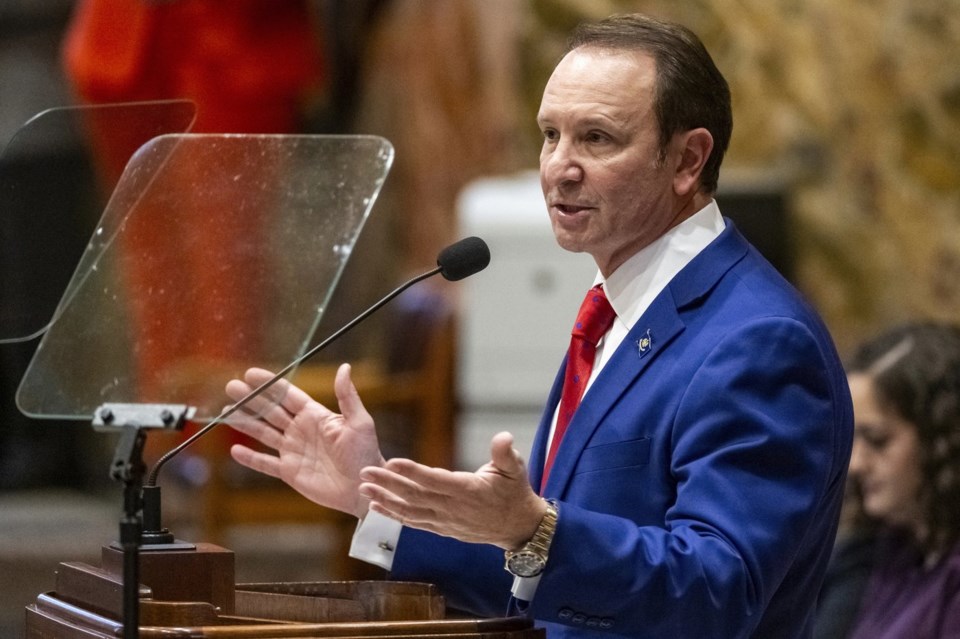BATON ROUGE, La. (AP) — Louisiana Gov. Jeff Landry is pushing to deliver income and corporate tax cuts. But a Senate committee Tuesday introduced significant changes to the sweeping reform package in response to concerns raised by lawmakers, lobbyists and local governments.
What does the tax overhaul aim to do?
Landry and his allies in the GOP-dominated legislature frame the package as a way to streamline the tax code to make it more business-friendly.
They say that reducing corporate income tax and repealing the 0.275% corporate franchise tax — a levy on companies for doing business in the state, worth more than $500 million annually — will improve Louisiana's economy. They also want to bring the individual income tax to a flat 3%, intended to keep Louisiana competitive with neighbors like Texas, which has no income tax.
The overhaul would tax digital products and services like online streaming sites, estimated to raise $40 million in revenue annually. Other changes would free up money to increase teacher pay and double income tax exemptions for seniors.
Where's the opposition coming from?
Local governments, lawmakers on both sides of the aisle, and special interests ranging from the film industry to petrochemical lobbyists, have all pushed back on the proposed legislation during a special session that must be concluded within three weeks.
“I think pretty much everyone thinks this is too much in too little time and too fast and that there could be huge repercussions,” said Democratic Rep. Mandie Landry, who has been one of the most vocal opponents of the tax package.
Some local governments have warned of significant revenue loss, though Landry has promised they will be made whole. Even with the proposed tax package's new revenue streams, Rapides Parish in Central Louisiana stood to lose more than $20 million in revenue as result of the changes, said Tax Administrator Betty Jo Bourgeois.
The Senate Revenue and Fiscal Affairs committee on Tuesday passed an amendment to allow local governments to continue collecting taxes on prescription drugs, a major revenue source initially on the chopping block. But Bourgeois said she remains unsure how her parish will fare.
The tax reform package also originally proposed eliminating tax credits for film production and historic property development, both of which were retained in some form — though with reductions — by the Senate committee following howls of protest from film industry leaders.
The Senate committee agreed to preserve tax breaks at so-called foreign trade zones in Louisiana ports, catered to the oil and gas industry, which would save them tens of millions of dollars.
While a number of Democratic lawmakers have voted in favor of the tax reform package, a small group have opposed the tax overhaul on the grounds that it would disproportionately benefit corporate shareholders and place a greater burden on lower-income households. Louisiana's tax system is already ranked the tenth most regressive in the country, according to a from the left-leaning Institute on Taxation and Economic Policy.
Most importantly for the tax reform package's overall success, some Republican lawmakers have and have so far refused to sign on to the revenue-raising portions of the package.
What are the next steps?
Lawmakers need to find a way to balance the state budget to make up for the $1.3 billion annual revenue hole created by the proposed income tax cuts.
Around six or seven Republican lawmakers are needed to get the two-thirds vote necessary to pass a key bill to expand sales tax to 42 new services like car washes. But the bill has been stalled in the House since last Thursday, according to Rep. Neil Riser, who is sponsoring the legislation.
To win over the holdouts, Riser has proposed slashing the number of services to be taxed to 19.
Sen. Franklin Foil, who chairs the Revenue and Fiscal Affairs committee, said that when it comes to expanding sales taxes to more services, “there hasn’t seemed to be an appetite for that over here."
Foil's committee also proposed on Tuesday to reduce the highest tier corporate income tax rate from 7.5% to 6%, though a flat 3.5% rate.
Another option to raise revenue is to increase the statewide sales tax to 4.50%, Foil said. Landry had proposed keeping the rate at 4.45% by preserving a increase set to expire next year.
Louisiana already has the highest combined state and average local sales tax rate in the country — 9.56% — according to the , a conservative think tank.
Foil said that he believed getting a lower income and corporate income tax rate would move the state in the right direction, even if the sales tax had to be increased and expanded to pay for it.
“It is a choice we will have to make,” Foil said.
___ Brook is a corps member for The Associated Press/Report for America Statehouse ߣÄĚÉçÇř Initiative. is a nonprofit national service program that places journalists in local newsrooms to report on undercovered issues. Follow Brook on the social platform X: @jack_brook96
Jack Brook, The Associated Press




